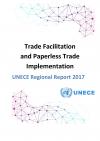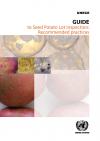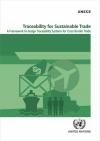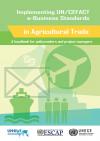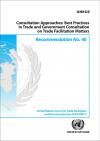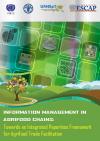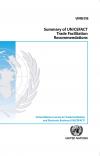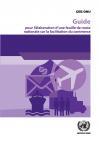Trade Publications
Displaying Results 81 - 100 of 277
- English
Recommendation 42 on Trade and Transport Facilitation Monitoring Mechanisms (TTFMM) addresses issues related to institutional arrangements and methodology in designing and implementing TTFMM. It is an important contribution to UNECE’s suite of Trade Facilitation recommendations and guidance
- English
Since the introduction in 1973 as the UNECE Recommendation No. 1, the UN Layout Key (UNLK) has provided Governments, organizations and the business community with a basis for a standard and aligned design of documents used in trade and transport. This has led to a major improvement in the
- English
The Explanatory Brochure on the Standard for Sweet Peppers has been developed to harmonize the interpretation of the Standard, thereby facilitating international as well as national trade. It addresses producers and traders, as well as inspection authorities. It corresponds to the latest edition
- English
Facilitating trade is about streamlining and simplifying international trade, particularly import and export procedures, transit requirements and procedures applied by Customs and other agencies (UNECE-UN/CEFACT). With the rapid increase of international trade, thanks in part to the reduction of
- English
- English
- English
This Guide refers to the UNECE STANDARD S-1, concerning the marketing and commercial quality control of Seed Potatoes. Knowledge of the relevant requirements is essential for the inspector.
Inspection is the visual examination of plants, tubers, containers, equipment or facilities by an authorized
- English
- English
The joint UNECE-OECD publication “International Regulatory Cooperation: the Case of the United Nations Economic Commission for Europe” presents the rule-making and standards-setting activities of UNECE.
It is
- English
Consumers and producers are increasingly interested in knowing how products are made and whether there are any adverse environmental or social impacts. While two products may look or feel similar, consumers may still distinguish between them on the basis of certain intangible policy claims, such
- English
- English
Persimmons - Explanatory Brochure (ECE/TRADE/417)
The Explanatory Brochure on the Standard for Persimmons (ECE/TRADE/417) has been developed to harmonize the interpretation of the Standard, thereby facilitating international as
- English
The purpose of Recommendation N°. 40 (ECE/TRADE/423) is to inform government agencies and private sector stakeholders about approaches to effective consultations that will be flexible, transparent,
- English
- English
This publication (ECE/TRADE/346/Rev.1) contains the latest information on trade facilitation recommendations established under the auspices of the United Nations Centre for Trade Facilitation and
- English
The aim of this bi-lingual Publication (ECE/TRADE/424) is to help bring voluntary standards into the toolbox of disaster risk reduction, including both by encouraging their use by business and by
- English
- English
- English
- English



